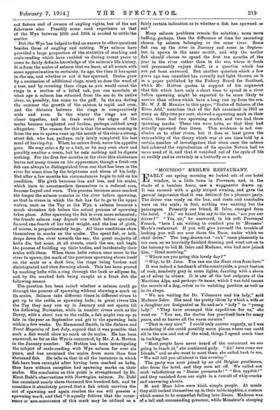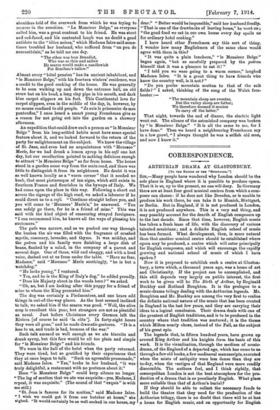"MOUSSOO" MERLE'S RESTAURANT.
EARLY one spring morning we looked out of our hotel window, in a little town in Provence, and, in the shade of a bamboo fence, saw a waggonette drawn up.
It was covered with a gaily striped awning, and gas. the general impression that it was destined for a pleasure party.
The driver was ready on the box, and coats and sunshade' were on the seats; in fact, nothing was wanting but the passengers. Presently our friend, M. Isere, emerged from the hotel. " Ab," we heard him say to the man, "are you our driver ?" "Yes, sir," he answered, in his soft Provençal French, "here I am waiting to conduct you to 'Moussoo' Merle's restaurant. If you will give yourself the trouble of
looking you will see over there the Bann, under which we shall drive." The long-drawn-out "oo's" came pleasantly to
our ears, so we hurriedly finished dressing and went out on to the balcony to bid M. Isere and Madame, who had now joined him, " Good morning."
"Where are you going this lovely day ? "
"Why, to St. Jean. You can see the Brion even horn here." It was indeed a landmark of the countryside, a great bastion of rock, sombrely grey in some lights, dazzling with a sheen as of silver in others. It is one of the last outposts of the Maritime Alps, and perhaps its name, which I was told meant the muzzle of a dog, refers to its watching position as well as to its shape.
" We are waiting for Dr. Villeneuve and his lady," said Madame Isere- She used the pretty idiom by which a wife or a daughter are designated as So-and-so's " lady " or "young lady." "They have arranged this expedition for us," she went on. " You see, the doctor has practised here for many years, and so knows all the warm corners."
"That is very nice." I could only answer vaguely, as I was wondering if she could possibly mean places where one could sit in the sun and out of the wind, things I spend much time in looking for.
"Moat people have never heard of the restaurant we are going to lunch at," she continued gaily. "Ah! here come our friends," and as she went to meet them she called back to me, "We will tell you all about it this evening." The party was next joined by an old Belgian gentleman, also from the hotel, and they soon set off. We called out such valedictions as "Bonne promenade!" "Bon app6tit!" and they vanished from our eight in a tumult of whip-cracks and answering shouts.
M. and Mme. Isere were kind, simple people. At meals they still tucked themselves up in their table napkins, a custom which seems to be somewhat falling into disuse. Madame was of a tall and commanding presence, while Monsieur's stooping
shoulders told of the overwork from which he was trying to recover in the sunshine. " Le Monsieur Beige," as everyone called him, was a great contrast to his friend. He was stout and red-faced, and his contented laugh was no doubt a good antidote to the "ideas soiree," which Madame Isere said some- times troubled her husband, who suffered from "nn peu de neurasthenie," as he told use one day.
"The other was lean Benedict,
Who was so thin and sallow
He scarce would make a candlewick
For Boniface's tallow."
Almost every "hotel pension" has its ancient inhabitant, and "le Monsieur Beige," with his fourteen winters' residence, was a credit to the good cooking of the house. He was generally to be seen walking np and down the entrance hall, an old straw hat on his head, a long clay pipe in his mouth, and dark blue carpet slippers on his feet. This Continental love for carpet slippers, even in the middle of the day, is, however, by no means confined to old people. " Je suis le prisonnier de elms pantonfles," I once heard a smart young Frenchman give as a reason for not going out into the garden on a showery afternoon.
An expedition that could draw such a person as " le Monsieur Beige" from his long-settled habits must have some special feature about it, and we looked forward to the return of the party for enlightenment on the subject. We knew the village of St. Jean, and even had an acquaintance with "Moussoo" Merle, for we had drank a lemon syrup in his café one hot day, hut our recollection pointed to nothing delicious enough to attract " le Monsieur Beige" so far from home. The house stood in a garden some way from the main road, and there was little to distinguish it from its neighbours. No doubt it was so well known locally as a "warm corner" that it needed no bush, that most picturesque of inn signs, which still exists in Southern France and flourishes in the byways of Italy. We bad come upon the place in this way. Following a short cut across the zigzags of the high road, we asked a labourer if be could direct us to a café. " Continue straight before you, and you will come to Mousse° ' Merle's," he answered. "Yon can safely go there, for he is a friend of mine." This was said with the kind object of reassuring strayed foreigners. "I can recommend him, he knows all the ways of pleasing his customers."
The path was narrow, and as we pushed our way through the bushes the air was filled with the fragrance of crushed myrtle, rosemary, lavender, and thyme. It was midday, and the patron and his family were finishing a large dish of beans, flanked by a salad, in the company of a parrot and several dogs. One of these, wild and shaggy, and with a loud voice, dashed out at us from under the table. "Have no fear, Madame," said "Moussoo" Merle soothingly, "he is but a watchdog."
"He looks young," I ventured.
" Yes, and be is the King of Italy's dog," he added proudly. " Does his Majesty shoot in the woods here ? " we asked. "Oh, no, but I am looking after this puppy for a friend of mine to whom the King presented him."
The dog was certainly a Piedmontese, and one bears odd things in out-of-the-way places. As the host seemed inclined to talk, we asked him if the season was good. " Well, the olive crop is excellent this year, but strangers are not as plentiful as usual. Just before Christmas every German left the Riviera [of course he said •la cote]. In forty-eight hours they were all gone•" and he made dramatic gestures. "It is a loss to us, and trade is bad, because of the war."
Such talk amused us well enough as we ate biscuits and drank syrup, but this fare would be all too plain and simple for "le Monsieur Beige" and his friends.
We were in the hall of tlie hotel when the party returned. They were tired, but so gratified by their experiences that they at once began to talk. "Such an agreeable promenade," said Madame Isere. " Yes," broke in her husband, "it was truly delightful, a restaurant with no pretence about it."
Here "le Monsieur Beige" could keep silence no longer, a The leg of mutton that we ate was exquisite—yes, Madame, I repeat, it was exquisite." (The sound of that " exquis" is with me still.)
"St. Jean is famous for its mutton," said Madame Isere. " I wish we could get it from our butcher at home," she sighed. "It would certainly be as well cooked in our house, my
dear." " Better would be impossible," said her husband fondly. " That is one of the drawbacks of leaving home," he went on ; "the good food we eat in our• own house every day spoils us for ordinary hotel cooking."
I have heard other Frenchmen say this sort of thing. I wonder how many Englishmen of the same class would agree with them in this?
"It was quite a plain luncheon," "le Monsieur Beige" began again, "but so carefully prepared by the patron himself that it was a pleasure to eat it! "
"I told you we were going to a warm corner," laughed Madame Isere. "It is a great thing to have friends who know the country well, is it not?"
"Do you prefer mountain mutton to that of the salt fields?" I asked, thinking of the Bong of the Welsh free- booter :—
"The mountain sheep are sweeter, But the valley sheep are fatter; We therefore deemed it meeter
To carry off the latter."
That night, towards the end of dinner, the electric light went out. The silence of the astonished company was broken by " le Monsieur Beige." " It is all the same to me, for I have done." Then we heard a neighbouring Frenchman say in a low growl, " I always thought he was a selfish old man, and now I know it."











































 Previous page
Previous page